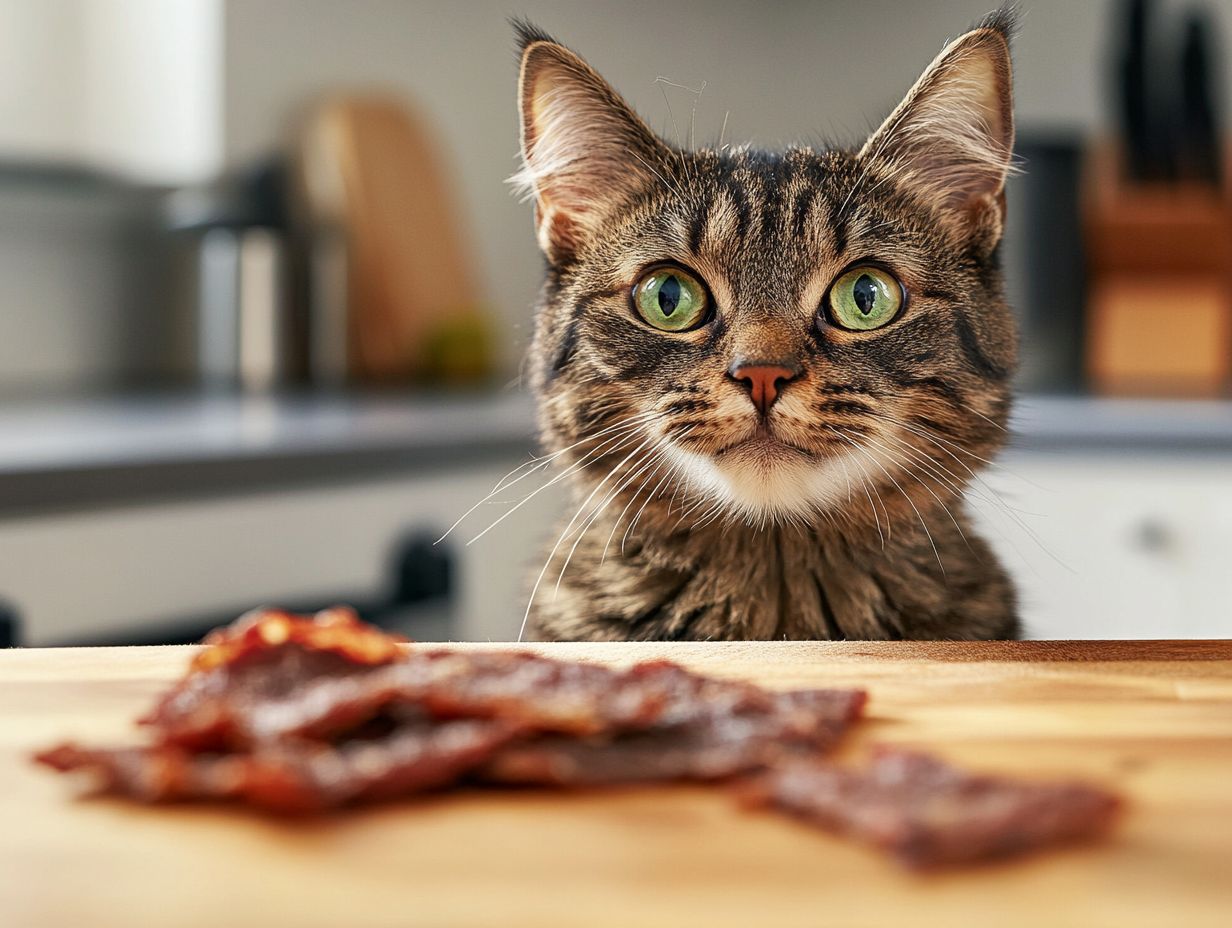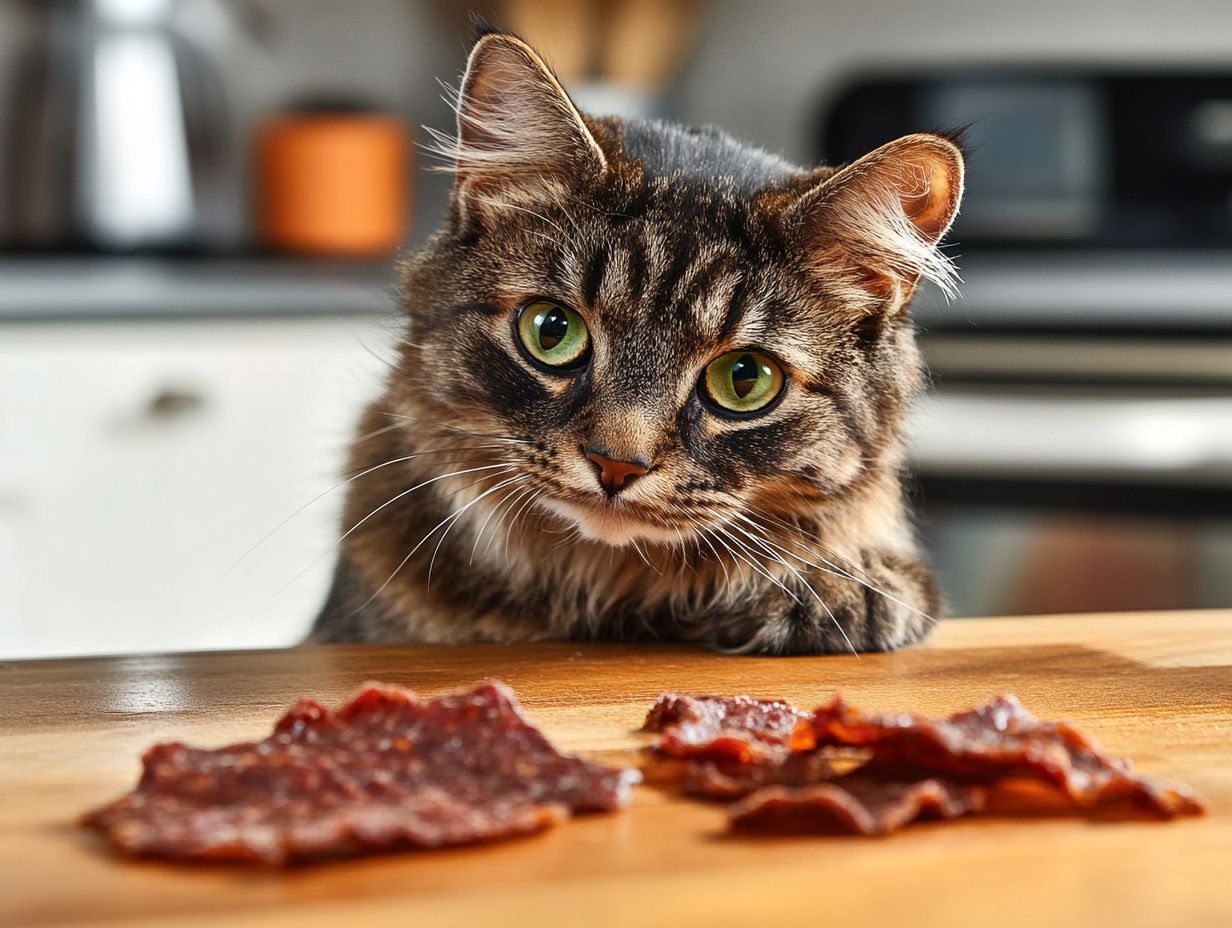Many cat owners wonder about the safety of sharing snacks like beef jerky with their pets. However, it is crucial to understand that this popular treat is unsafe for cats due to its high sodium content and other harmful ingredients. Understanding feline dietary needs is essential for their health and well-being. Cats, as obligate carnivores, depend on a meat-based diet to thrive.
This article explores common questions regarding cats’ diets, the risks associated with feeding them beef jerky, and healthier alternatives to consider. We’ll also cover tips on how to introduce new foods to your cat, ensuring a smoother transition for their taste buds. Join us as we navigate the ins and outs of feline nutrition!
Frequently Asked Questions
Is beef jerky safe for cats?
No, beef jerky poses several health risks for cats, including sodium poisoning and digestive issues.
What are the risks of feeding beef jerky to cats?
Feeding beef jerky to cats can lead to obesity, high sodium content, and increased veterinary expenses due to associated health problems.
Key Takeaways:
- Cats have a specific diet that consists mainly of meat, so beef jerky should be strictly avoided due to potential health risks such as sodium poisoning and digestive issues.
- Beef jerky contains high levels of sodium and additives that can be harmful to cats, presenting a choking hazard due to its tough texture.
- Healthier treat options include cooked chicken or unseasoned fish, cut into appropriate bite-sized pieces. Introduce new foods gradually and monitor your cat’s reaction.

Understanding Cats’ Diet
Understanding the dietary needs of cats is essential for any cat owner who wishes to ensure that their pets receive proper nutrition. As obligate carnivores, cats require a meat-based diet crucial for their health and well-being.
Each cat has unique dietary requirements, necessitating careful food choices and any dietary supplements to avoid specific health issues. This guide will explore feline nutrition, outline what constitutes a balanced diet, identify common allergens such as those from the Allium family (onions and garlic), and emphasize the importance of consulting a veterinarian for personalized recommendations.
What Do Cats Normally Eat?
Cats typically thrive on a protein-rich diet primarily composed of meat, complemented by small amounts of vegetables for added nutrients. This protein is vital for building strong muscles and maintaining overall health, as well as various bodily functions.
Omega-3 and Omega-6 fatty acids play a crucial role in promoting a healthy coat, skin, and joint function. A balanced diet for cats should include a combination of animal-based proteins alongside small portions of non-toxic vegetables, like carrots or peas, which provide additional vitamins and fiber.
Achieving the right balance ensures that their nutritional needs are met while respecting their natural dietary instincts, ultimately leading to a healthier and happier life.
Is Beef Jerky Safe for Cats?
Beef jerky is not safe for cats and poses several health risks. This processed meat typically contains high sodium levels, potentially leading to serious health issues, including sodium poisoning. Additionally, seasoning may exacerbate these problems.
The hard and chewy texture of beef jerky presents a choking hazard, particularly for smaller or overweight cats.
Potential Risks of Feeding Cats Beef Jerky

Feeding cats beef jerky poses significant risks, including obesity, high sodium content, and increased veterinary expenses due to health issues.
Particularly concerning is obesity, as the high caloric content of beef jerky can lead to weight gain that pet owners may not initially recognize as a threat. Regularly giving such treats may increase the risk of obesity, leading to serious life-threatening conditions like diabetes and arthritis.
Moreover, excessive sodium can result in long-term issues such as high blood pressure and kidney problems. These health risks not only jeopardize a cat’s well-being but also impose a financial burden on owners in the form of emergency veterinary bills and ongoing healthcare costs.
Always prioritize your cat’s nutritional needs by choosing safe, vet-approved treats. Consult with your veterinarian for personalized dietary guidance.
It’s essential to seek healthier snack alternatives that promote long-term health and help avoid unexpected veterinary expenses. Consider treats from reputable brands specifically designed for cats. For more information, check out this article on Can Cats Eat Beef Jerky? Safe or Not?.
Alternatives to Beef Jerky for Cats
There are several safe and healthy alternatives for cat treats.
Healthy Treat Options
Two Chicks Jerky and other dried meat alternatives designed specifically for cats are excellent options for meat-based diets. These products cater to the dietary needs of cats while offering similar enjoyment without unhealthy additives.
For example, Two Chicks Jerky offers a cat-friendly jerky that delivers a protein-rich snack, supporting muscle development in cats. Traditional beef jerky is often too tough for cats’ digestive systems and can be harmful due to seasoning. Each piece of cat-friendly jerky should be no more than 10% of your cat’s daily caloric intake.
Thus, Two Chicks Jerky serves as a safer alternative, featuring a texture and flavor suited for cats. With no harmful preservatives, pet owners can confidently provide a snack that aligns with their cat’s nutritional needs without compromising overall health.
How to Introduce New Foods to Cats
Introducing new foods to cats should be a gradual and careful process, as sudden changes can lead to digestive issues and other health problems that responsible cat owners wish to avoid.
Gradual Transition and Monitoring

A gradual transition to new foods is essential to ensure that cats adjust well and do not encounter any adverse health issues. New foods should be introduced slowly, typically over 7 to 10 days, to facilitate smoother adjustment and minimize digestive upset. The best approach is to mix a small amount of the new food with the cat’s current diet.
Gradually, increase the proportion of the new food while decreasing the old food. Monitor your cat’s behavior during this period. Note any changes in behavior, litter box habits, or appetite, as these can indicate how well the cat is adapting to the new diet.
Conclusion
In conclusion, while beef jerky may seem like a tasty treat, it poses health risks for cats due to high sodium and preservatives. Always consult with your veterinarian regarding your cat’s diet and opt for safer treats that cater to their nutritional needs.
Health Risks of Beef Jerky
Beef jerky is often high in sodium and may contain preservatives unsafe for cats. Sodium poisoning can occur if a cat ingests too much sodium, leading to symptoms such as excessive thirst, urination, vomiting, and even seizures. It’s crucial to be vigilant and consult your veterinarian if your cat consumes more than a small piece of jerky.
Can I Make Homemade Beef Jerky for My Cat?
No, you should not make homemade beef jerky for cats. The ingredients and preparation methods used for homemade jerky may not be safe and can lead to health issues. Stick to commercially available treats specifically made for cats.
Guidelines for Safe Feeding
If your cat consumes beef jerky, follow these steps:
- Immediately consult your veterinarian if more than a small piece is ingested.
- Monitor your cat for symptoms of distress or illness.
- Provide fresh water to help flush out any harmful substances.
Safer Alternatives
Consider offering your cat treats like freeze-dried chicken or commercially prepared snacks designed for feline dietary needs. Always follow the recommended portion sizes to avoid overfeeding.
Always prioritize your cat’s health by choosing treats designed specifically for their dietary needs, and consult your veterinarian for personalized recommendations.